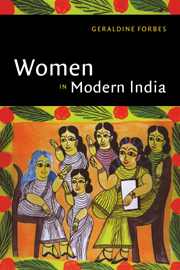Book contents
- Frontmatter
- Introduction
- 1 Reform in the nineteenth century: efforts to modernize women's roles
- 2 Education for women
- 3 The emergence of women's organizations
- 4 The movement for women's rights
- 5 Women in the nationalist movement
- 6 Women's work in colonial India
- 7 A time of transition
- 8 Women in independent India
- Bibliographic essay
- Index
- THE NEW CAMBRIDGE HISTORY OF INDIA
- References
5 - Women in the nationalist movement
Published online by Cambridge University Press: 28 March 2008
- Frontmatter
- Introduction
- 1 Reform in the nineteenth century: efforts to modernize women's roles
- 2 Education for women
- 3 The emergence of women's organizations
- 4 The movement for women's rights
- 5 Women in the nationalist movement
- 6 Women's work in colonial India
- 7 A time of transition
- 8 Women in independent India
- Bibliographic essay
- Index
- THE NEW CAMBRIDGE HISTORY OF INDIA
- References
Summary
Helena Dutt, a Bengali revolutionary, said ‘[we] were like caged tigers’ in explaining how she and other girls her age leapt into education and politics. Women more conservative than Helena and her friends were told ‘the house is on fire’ and they should come out of the burning house and help put out the fire. From liberal homes and conservative families, urban centers and rural districts, women - single and married, young and old - came forward and joined the struggle against colonial rule. Though their total numbers were small, their involvement was extremely important. Women's participation called into question the British right to rule, legitimized the Indian nationalist movement and won for activist women, at least for a time, the approval of Indian men.
Politics completely altered the goals and activities of organized women. Education, social reform and women's rights appealed to some progressive women, but the movement to rid the country of its foreign rulers attracted people from all classes, communities, and ideological persuasions. Nationalist leaders deliberately cultivated linkages with peasants, workers, and women's organizations to demonstrate mass support for their position. Women were amazed to find political participation approved of by men who wanted their wives to behave in the home like the perfect wives in religious texts. Manmohini Zutshi Sahgal, a freedom fighter jailed in Lahore in 1930, wrote about a woman who joined a demonstration and was arrested while her husband was at work. He sent word to the jail that she could not return home after her release. Manmohini's mother, Lado Rani Zutshi, intervened on behalf of the woman.
- Type
- Chapter
- Information
- Women in Modern India , pp. 121 - 156Publisher: Cambridge University PressPrint publication year: 1996
References
- 2
- Cited by

